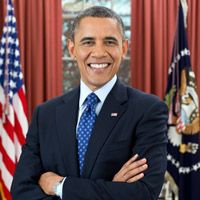Article
President Obama Announces More Aid in Ebola Fight
Author(s):
The outbreak of the Ebola virus in West Africa is showing no signs of slowing down. As a result, President Barack Obama announced Tuesday that the United States would be getting even more directly involved in the effort to contain the outbreak and prevent it from spreading any further.

The outbreak of the Ebola virus in West Africa is showing no signs of slowing down. As a result, President Barack Obama announced Tuesday that the United States would be getting even more directly involved in the effort to contain the outbreak and prevent it from spreading any further.
In a speech delivered at the headquarters of the US Centers for Disease Control and Prevention, President Obama said it was important that more be done as the death toll continues to rise. While noting that the CDC has already sent hundreds of people to assist the countries directly affected by the outbreak, the president said this new effort would include help in a variety of forms‑‑from military to medical support.
“Ebola is now an epidemic of the likes that we have not seen before,” the president said. “It’s spiraling out of control. It’s getting worse. It’s spreading faster and exponentially. Today, thousands of people in West Africa are infected. That number could rapidly grow to tens of thousands.”
The additional personnel, he said, will help the countries that need it most.
“Hospitals, clinics and the few treatment centers that do exist have been completely overwhelmed,” the president noted. “An already very week public health system is near collapse in these countries. Patients are being turned away, and people are literally dying in the streets.”
During his speech, President Obama also noted that despite the growing number of infected patients, the virus is unlikely to make its way across the ocean.
“I want the American people to know that our experts, here at the CDC and across our government, agree that the chances of an Ebola outbreak here in the United States is extremely low,” he said.
“We’ve been taking the necessary precautions, including working with countries in West Africa to increase screening at airports so that someone with the virus doesn’t get on a plane for the United States. In the unlikely event that someone with Ebola does reach our shores, we’ve taken new measures so that we’re prepared at home.”
Those steps include helping flight crews identify potentially ill patients in flight, working with labs in the country so they will be able to perform quick turnarounds on tests, and working with health care professionals to ensure that any potential patients receive the proper treatments they might need upon arrival here.
“We know that if we take the proper steps we can save lives,” the president said. “But we have to act fast. We can’t dawdle on this one. We have to move with force and make sure that we are catching this as best we can, given that it has already broken out in ways that we had not seen before.”
The strategy has been organized into four goals, according to the speech. They include: controlling the outbreak, looking at the impact of local economies to prevent “a truly massive humanitarian disaster,” coordinating a more global response to the outbreak, and helping rebuild the health care systems in the countries where the virus has struck the hardest.
Multiple media reports and information from the White House have put the number of personnel as part of the effort at close to 3,000, which is nearly 1,000 more than number of people reported infected by Ebola. President Obama said in his speech that a “military command center” will be established in Liberia as the headquarters for the effort.
“Our forces are going to bring their expertise in command and control, in logistics, in engineering. And our Department of Defense is better at that, our Armed Services are better at that than any organization on Earth,” he said.
The overseas deployment will include expediting supplies to Liberia, where they can be dispersed as needed, creating a training site for health care professionals, as well as building a new field hospital and treatment units.
“The reality is that this epidemic is going to get worse before it gets better,” President Obama said. “But right now, the world still has an opportunity to save countless lives. Right now, the world has the responsibility to act — to step up, and to do more. The United States of America intends to do more.”


